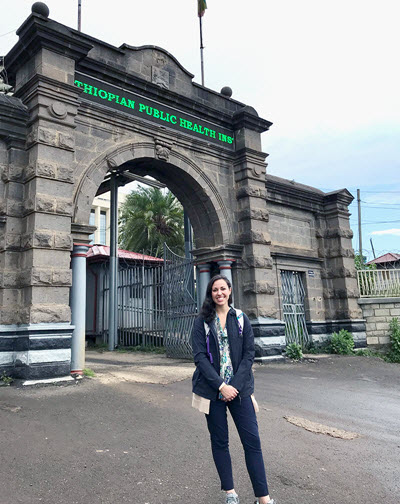MS student Marlena Bannick always knew she wanted to work in a field where she could positively impact the health of populations, though she wasn't sure what the best fit would be. But once she took her first biostatistics course as an undergrad at UW, she was hooked. She loved digging deeper into statistical methodology, thinking critically about study design and analysis, and developing her programming skills.
“The rapidly developing statistical and computational methods make biostatistics such an exciting field that directly works to improve population health,” says Bannick. “In biostatistics, there is always more to learn.”
A fellowship with the UW’s Institute for Health Metrics and Evaluation (IHME) has allowed Bannick to put her ambitions and skills into action. Bannick’s fellowship supports IHME’s Global Burden of Disease (GBD) project, a massive research study that seeks to quantify health loss in terms of morbidity and mortality from all diseases and injuries, for all countries in the world (and some subnational locations), in age- and sex-specific demographic groups for all years since 1980.
“The study is incredibly exciting because of its breadth, cutting-edge methodology, and global relevance.” Bannick says. “An undertaking such as the GBD would not be possible were it not for the literally thousands of people involved all over the world from fields as varied as medicine to software engineering.”

The GBD study uses a wide variety of statistical methods for big data. Bannick says her specific role on the study for the last year or so has been in maintaining and improving the Cause of Death Ensemble Model (CODEm).
“It's an ensemble of many different linear models with different functional forms, covariates, and amounts of spatial-temporal smoothing. It uses intelligent model selection and cross-validation methods tailored specifically to the nuances of global health data.”
In August, Bannick’s fellowship took her to Ethiopia where she experienced first-hand the important role collaboration plays in any scientific endeavor. While there, she worked with colleague, Awoke Temesgen Misganaw, an IHME faculty member who is based there, and who started the Burden of Disease Unit at Ethiopian Public Health Institute (EPHI).
“Everyone was eager to discuss GBD methods and results, and also to teach us about the country-specific health context of Ethiopia,” says Bannick
Bannick’s experience taught her about common challenges with data storage and retrieval, and about how nuances in data collection and the context in which the data were collected needs to be factored into any analysis.
Bannick is pursuing a master’s degree in the UW Biostatistics MS Thesis program while she works on the GBD study as part of her fellowship with IHME. She hopes to continue working with the Ethiopian Public Health Institute while at IHME.
More information
The GBD updates its estimates annually so the most up-to-date evidence is always available to health researchers and policy-makers. The reports published on the project website facilitates the identification of priority areas for health funding and interventions, tracking of progress over time, and illumination of health disparities. Visit the GBD website at: www.healthdata.org/gbd